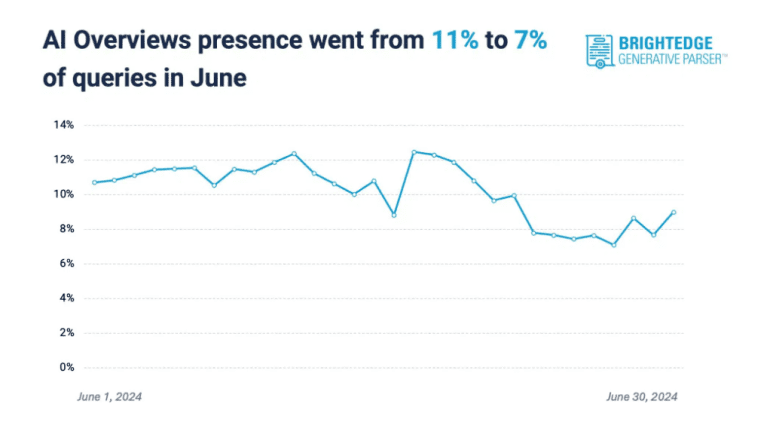- Google AI Overviews now appear for only 7% of queries, down significantly.
- Visibility drop started in mid-April, reaching 65% non-appearance by mid-year.
- Despite rollout announcements, AI Overviews showed in only 15% of queries initially.
- Concerns arose over accuracy, with examples of misleading AI-generated answers.
- Presence declined further in June from 11% to 7% of queries.
- Significant reductions seen in education (26% to 13%), entertainment (14% to nearly 0%), and ecommerce (26% to 9%) sectors.
- Physical space occupied by AI Overviews in search results reduced by 13%.
- Google shifted away from duplicating sources between AI Overviews and Classic Search.
- Changes in search query patterns: increased visibility for certain queries like “best,” “what is,” “how to,” and decreased for comparisons and user-generated content.
- Decrease in product comparison tables, viewers, carousels, and lists within AI Overviews.
Main AI News:
Google’s AI Overviews, once a prominent feature in search results, are now appearing for just 7% of queries, marking a notable decrease from previous levels. This shift, detailed in a recent analysis by BrightEdge, underscores several key trends reshaping Google’s search landscape.
Since mid-April, the visibility of AI-generated answers, known as AI Overviews, plummeted sharply, with non-appearance rates soaring to 65% by mid-year, up from 25%. Despite Google’s announcement of their rollout at Google I/O in May, AI Overviews only manifested in 15% of queries initially.
Concerns over the accuracy of AI-generated content also surfaced, with instances of misleading recommendations, such as advising the consumption of urine and rocks. Google responded with promises to enhance the reliability of AI Overviews.
Throughout June, AI Overviews continued to dwindle, dropping from 11% to 7% of queries according to BrightEdge’s findings. Although a minor resurgence was noted mid-month, the overall trend remains downward, particularly impacting sectors like education, entertainment, and ecommerce, where AI Overviews saw significant declines in presence.
Moreover, the physical footprint of AI Overviews on search results has shrunk by 13%, highlighting Google’s strategic adjustments in response to user behaviors and search intents. This includes a deliberate move away from duplicating content sources between AI Overviews and Classic Search, as Google aims to streamline information delivery and anticipate user queries proactively.
Changes in search query patterns further illuminate Google’s evolving strategy, with certain queries like “best,” “what is,” “how to,” and “symptoms of” increasingly triggering AI Overviews, while categories such as comparisons and user-generated content from platforms like Reddit and Quora experience significant reduction in visibility.
Additionally, Google has scaled back on displaying product comparison tables, viewers, carousels, and lists within AI Overviews, potentially in an effort to optimize space and enhance search relevance.
Amidst these transformations, SEOs, publishers, and content creators are closely monitoring the impact on organic search traffic, as Google’s continued evolution of AI Overviews poses challenges and opportunities alike.
Despite the decline in visibility, Google’s commitment to advancing AI Overviews remains steadfast, signaling ongoing adjustments aimed at refining user search experiences and expanding the utility of AI-driven features in the future.
Conclusion:
The declining visibility of Google AI Overviews, now appearing in only 7% of queries, signifies a significant shift in Google’s search strategy. This trend reflects Google’s ongoing efforts to streamline search results, enhance relevance, and mitigate issues related to the accuracy of AI-generated content. For the market, particularly SEO professionals and content creators, this signals a need to adapt strategies to optimize for traditional search results while also preparing for potential future changes in Google’s AI integration.

